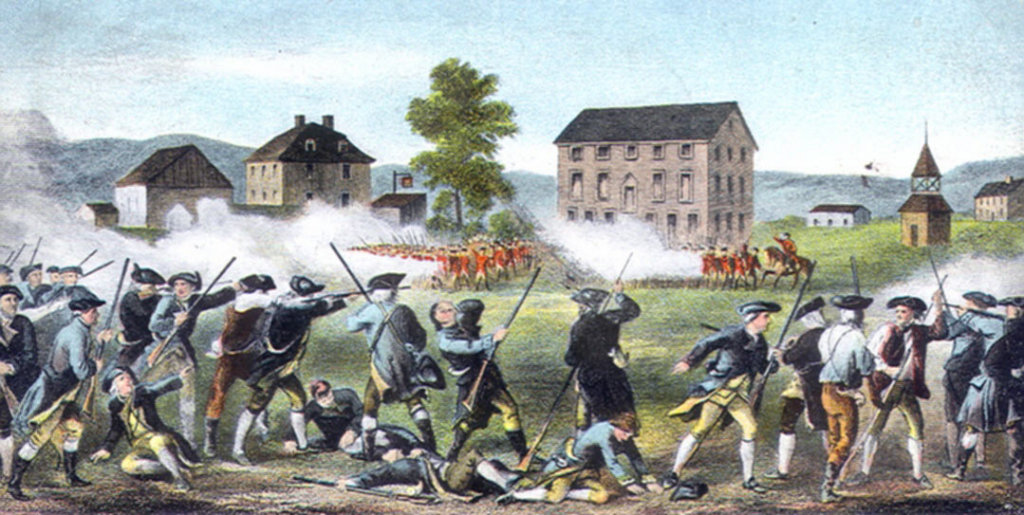On April 19, 1775, the first shots of the American War of Independence were fired at the Battle of Lexington and Concord. This pivotal moment, often referred to as the “shot heard around the world,” marked the beginning of a revolution that seemed avoidable at first. The British Parliament had actually proposed a plan offering the colonies a degree of self-governance—taxation, judicial independence, and even self-defense rights—while keeping nominal British authority intact. But, as often happens in history, things didn’t go according to plan.

The news of the Battle of Lexington and Concord reached the colonies a day after the fighting began. By then, blood had been spilled, and the possibility of reconciliation had evaporated. On July 31, 1775, the Second Continental Congress rejected Britain’s offer, and the colonies’ unity was solidified—there was no turning back.
As the shots rang out in Lexington, John Adams, one of the most fervent patriots, rode to the battlefield. The sight of bloodstains convinced him that the revolution was irreversible. He rode on to Philadelphia, becoming one of the most radical voices in the Continental Congress. His words would echo throughout the coming years: “A man of integrity could not hesitate.”
George Washington, too, was deeply affected. Upon hearing the news of the battle, he wrote to a friend: “Once a land so peaceful and joyous, America now faces either bloodshed or enslavement. What a bitter choice! But can a man of honor hesitate?”
Despite the battle’s significance, British General Thomas Gage, commander of British forces, dismissed it as a “small event” and issued a general amnesty to those willing to lay down their arms. However, two men—Samuel Adams and John Hancock—were excluded from this offer. Gage believed that by isolating these leaders, the rest of the colonial militias would fall in line. But Adams and Hancock became symbols of resistance, their popularity surging as the fight continued.
Meanwhile, the Second Continental Congress convened in Philadelphia on May 10, 1775. The mood was tense. On one hand, war had begun, with militias surrounding Boston and preparing for further confrontation. On the other, many colonies were not yet prepared to declare full independence. The question of whether to continue fighting or seek a peaceful resolution was more complicated than ever.
The Continental Congress faced hesitation. The New England militias had grown in strength, but the other colonies were unwilling to commit to a formal army. John Adams, ever the advocate for unity, urged the delegates to recognize that “the shot may soon be heard at your doorstep.” It was his vision that the revolution could only succeed if it was a united effort, and that meant raising a continental army.
On June 14, 1775, the Continental Congress, with Adams leading the charge, resolved to form the Continental Army. Now, the question was: who would lead this army? Many expected Adams to nominate his friend, John Hancock. After all, Hancock was a hero in Massachusetts, a wealthy and influential leader of the resistance. But Adams had a different candidate in mind—George Washington.
Washington, a southern gentleman from Virginia, was chosen as the commander-in-chief. His military experience, though not flawless, had earned him respect, and he was seen as a unifying figure who could bring the colonies together. Although Hancock was disappointed, he accepted the decision gracefully. Washington’s appointment marked a strange but important turning point—this southern aristocrat would lead a ragtag army of northern farmers and militias. It seemed an unlikely pairing, but over the next eight years, it would prove to be a perfect match.
Washington’s charisma and leadership would turn the Continental Army into a formidable force, and by the end of the war, he was not just their general but their father figure. The unlikely partnership of northern rebels and southern gentry turned out to be one of the most successful military collaborations in history.
Cultural Impact and Modern Relevance
The Battle of Lexington and Concord was more than just the beginning of a war; it was the spark that ignited a revolution. It set the stage for the creation of a new nation founded on ideals of liberty and self-determination. The courage and unity displayed by figures like John Adams, George Washington, and Samuel Adams were instrumental in the formation of the United States. Their actions and decisions continue to resonate today, as they remind us of the power of collective action and the importance of standing firm in the face of adversity.
In a world where political divisions often seem insurmountable, the story of America’s founding serves as a reminder that even the most unlikely alliances can achieve great things. Whether in times of war or peace, the ability to unite for a common cause remains one of the most powerful forces in shaping history.
As we reflect on the sacrifices made by those who fought for American independence, we are reminded that the values of freedom and unity are timeless, still guiding the decisions and aspirations of modern societies around the globe.

No comments yet.